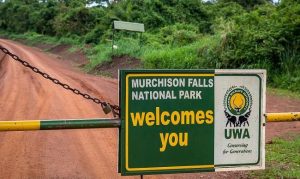StopEACOP, a group focused on putting a stop to the controversial East African Crude Oil Pipeline (EACOP) project, says it is deeply disturbed and gravely concerned by emerging reports that indicate that Total has started oil drilling activities in Uganda’s Murchison Falls National Park (MFNP).

The group insists that the move by the global energy giant threatens not only the biodiversity of the park but also its standing as a beloved tourist hub and a key contributor to Uganda’s economy.
The tourism industry, which is said to be reliant on the park’s existence, plays a crucial role in Uganda’s economy, generating significant revenue and creating countless livelihoods.
In 2022 for instance, tourism accounted for 59% of Uganda’s exports, earning the country $1.047 billion. Drilling for oil in MFNP, the organisation fears, puts these benefits at grave risk, threatening the socioeconomic fabric of Uganda.
Murchison Falls National Park, which is one of Uganda’s oldest, largest and most visited national parks, is said to be a sanctuary of global significance, recognised for its irreplaceable biodiversity and unparalleled natural beauty. The park is home to 76 species of mammals – including elephants, lions, and giraffes – and over 450 bird species, making it a remarkable and unique, irreplaceable ecosystem.
The park is also home to the Murchison Falls-Albert Delta Wetland System, a Ramsar Site of international importance. The Ramsar site is described as an important spawning ground for the Lake Albert fisheries. In 2018, Lake Albert accounted for the highest fish catch, 43%, in Uganda. Fishing is a multi-million-dollar industry in Uganda and the sector employs over 5 million people (direct and indirect employment).
“The Lake Albert fisheries are being put at risk by Total’s oil drilling in MFNP as the oil company’s activities are within the Area of Influence of the Murchison Falls-Albert Delta Ramsar,“ says the group.
The organisation stated that the drilling rig in MFNP “is painted with beige colour to resemble the surrounding Savannah grasslands” to supposedly reduce the impact on wildlife.
“Total regularly alleges that its oil activities will only affect 0.003% of MFNP, ignoring that the impacts go way beyond the surface of the well pads. Roads have been built inside the park, with approximately 600 truck trips registered through the park per month during the construction phase. Over 2,000 trips a day (between wells) during the exploitation phase, translating into 61,600 a month, are expected.
“The impacts of oil activities on wildlife are already very real. In particular, fleeing the noise and dust, elephants are increasingly going out of the national park, destroying the crops of neighbouring communities and endangering men, women and children. Women and children have been killed by elephants in Buliisa district, where MFNP is partly located, and Total’s Tilenga oil project activities are concentrated,“ StopEACOP disclosed.
It added: “The decision by TotalEnergies and its partners to drill for oil within MFNP, while ignoring the biodiversity conservation, climate change and socio-economic risks of their ill-conceived Tilenga and EACOP projects, is a direct contradiction to the global urgency to protect our remaining wild spaces and reduce fossil fuel reliance. It is clear that despite the global outcry and robust resistance from frontline communities and environmental groups, the interests of these companies are primarily focused on profit, with scant regard for the devastating environmental and socio-economic consequences their actions may unleash.“
Juliette Renaud, senior campaigner at Friends of the Earth France, said: “While the ravages of climate change are being felt more than ever, Total is breaking every conceivable boundary by starting oil extraction in one of the world’s most important biodiversity hotspots. The company is blinded by its quest for profits and develops its Tilenga and EACOP projects at all costs, despite the growing mobilisation worldwide denouncing this environmental and climate disaster and the associated human rights violations.”
Charity Migwi, Africa Regional Campaigner at 350.org: “We condemn the actions of TotalEnergies and their partners in the strongest terms. The drilling that has begun to exploit this natural treasure for short-term gain starkly contrasts the global momentum towards sustainability, biodiversity conservation, and climate justice. Allowing the fossil fuel industry to operate with such impunity will lead us down a perilous path of destruction that jeopardises the wellbeing of wildlife, human beings and our planet.”
Dickens Kamugisha of Africa Institute for Energy Governance in Uganda: “Preserving Murchison Falls National Park and maintaining its biodiversity is a matter of national interest to Uganda and a global responsibility. We implore the international community, environmental activists, tourists, and all concerned individuals to join us in resisting this alarming venture.”
Zaki Mamdoo, StopEACOP Campaign Coordinator: “Despite this recent development, activists worldwide must be reminded that it is not too late to stop oil exploitation in Murchison Falls National Park. While drilling has begun, the operation cannot reach its peak without the development of EACOP. This remains our task- to stop EACOP is to stop decades of oil exploitation in Murchison Falls, on Lake Albert and across the entire region. Total and their partners should be made to count their losses now, for the world stands to lose so much more.”
